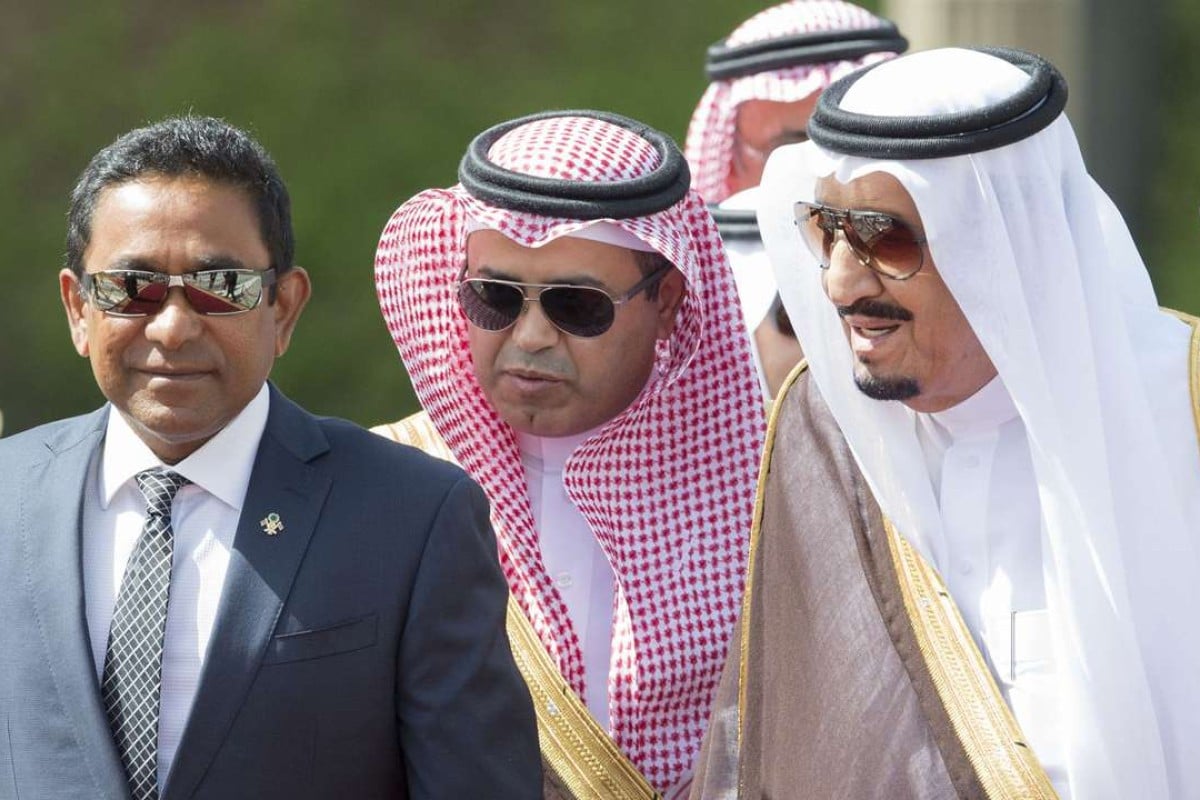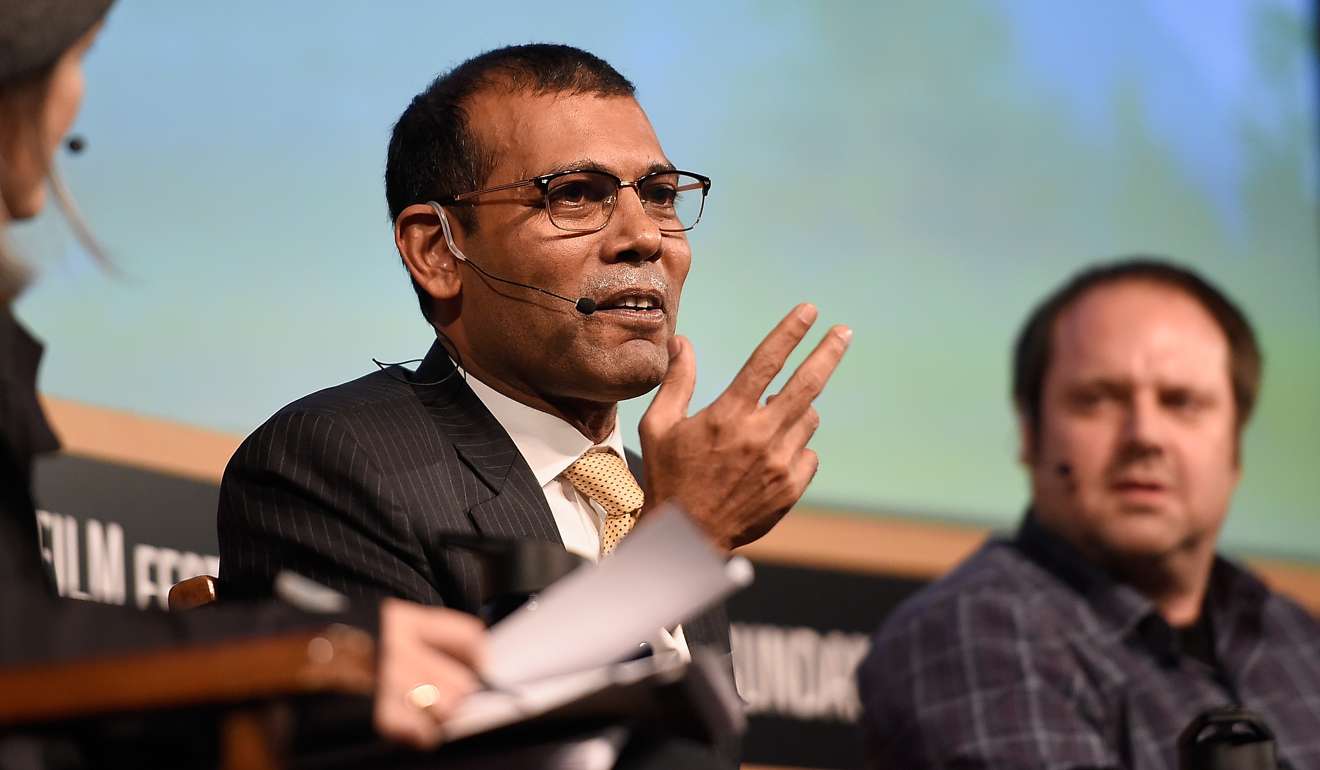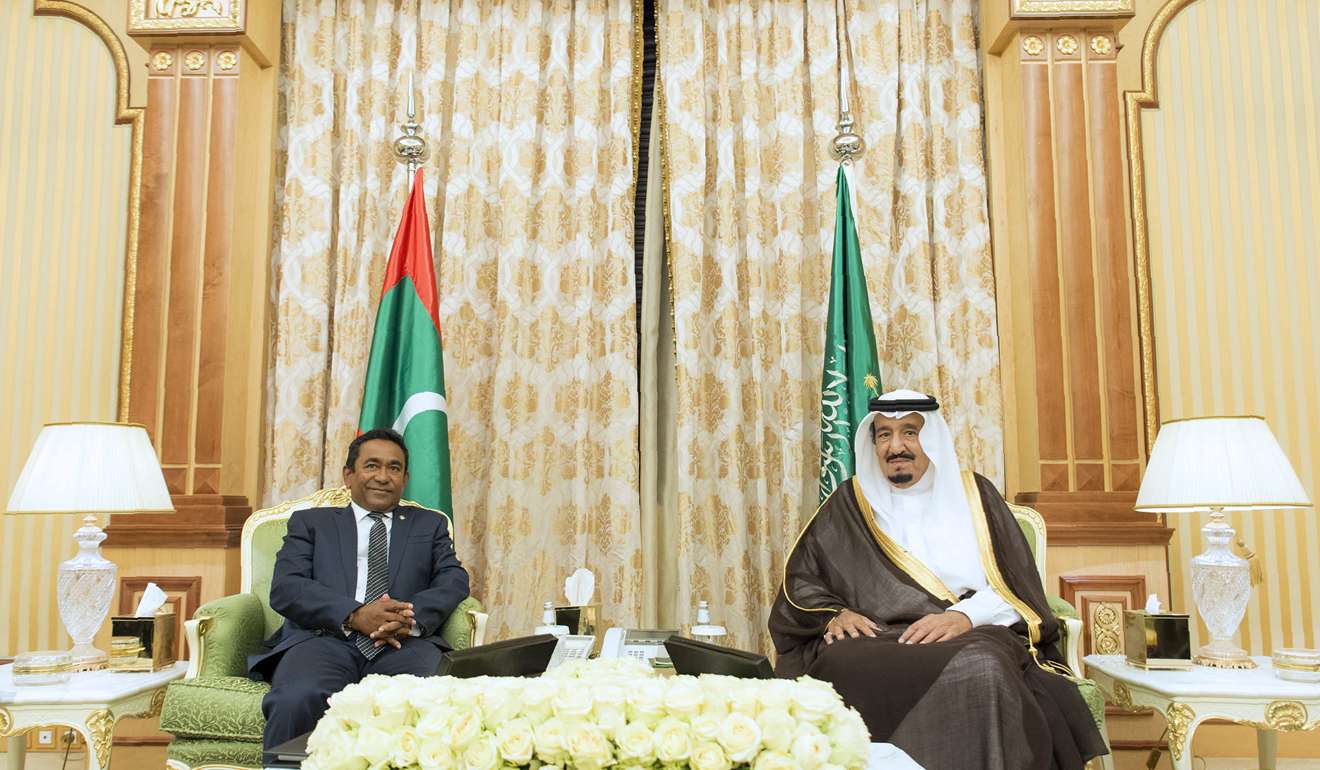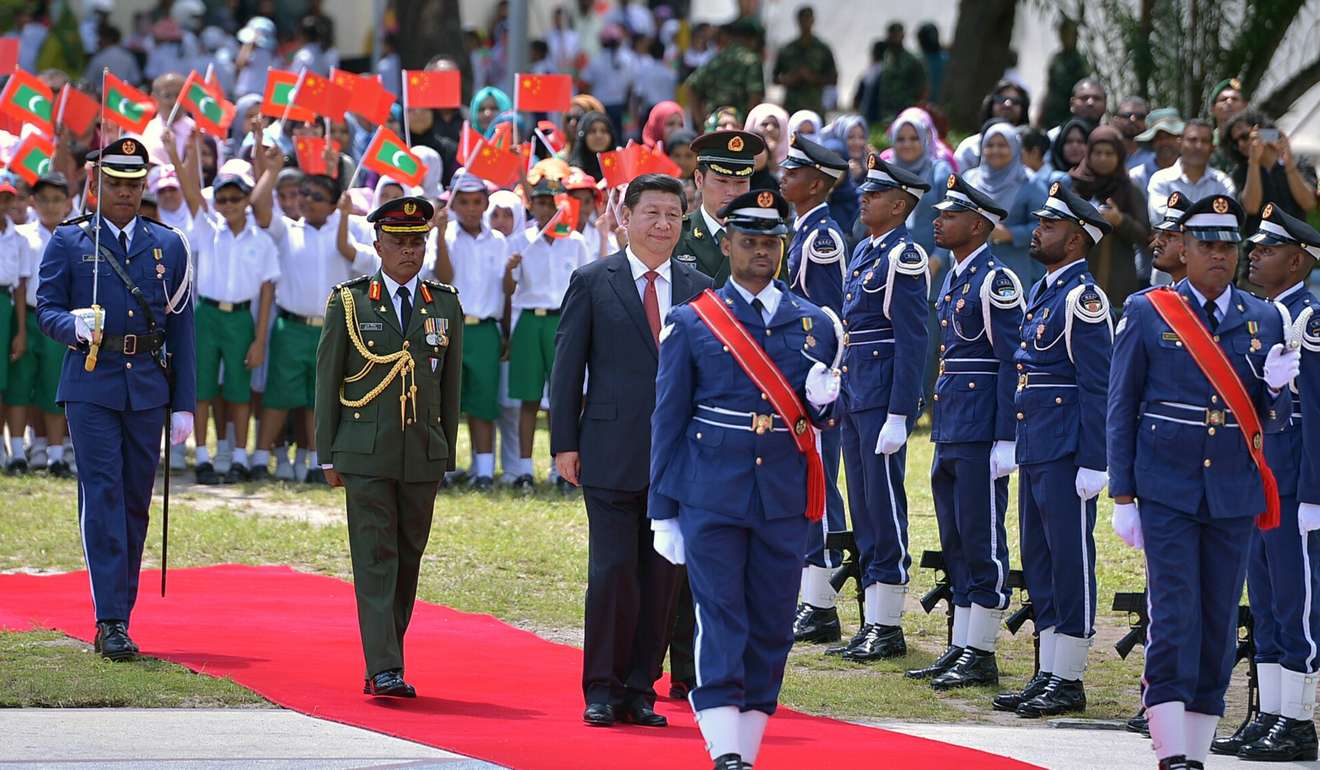WHY SAUDI ARABIA, CHINA AND ISLAMIC STATE ARE COURTING THE MALDIVES (JMD in SCMP)
As Riyadh and Beijing nurture
grandiose plans for military bases, New Delhi fears the archipelago could
become a breeding ground for the terrorist group
12 MAR 2017

Saudi King Salman welcomes the
Maldivian President Abdulla Yameen Abdul Gayoom to Riyadh in 2016. Photo: AFP
Saudi King Salman’s stop in the Maldives on
his month-long tour of Asia brings into focus how this tiny archipelago – best
known for high-end tourism and an existential battle against climate change –
has emerged as a key player in a regional struggle for influence.
Both Riyadh and Beijing are currying favour with
the strategically located 820km-long chain of Indian Ocean atolls, in efforts
analysts believe are aimed at gaining concessions for military bases.
China sees the islands as a node in its “string of
pearls” – a row of ports on key trade and oil routes linking the Middle Kingdom
to the Middle East – while for Saudi Arabia, the atolls have the added
advantage of lying a straight three-hour shot from the coast of regional rival
and arch-foe, Iran.
The possible building of Chinese and/or Saudi
military bases here would also complement the independent development of both
nations’ military outposts in Djibouti, an East African nation on a key energy
export route at the mouth of the Red Sea.


Exiled former president of the
Maldives, Mohamed Nasheed, speaks at a climate roundtable at the Sundance Film
Festival. Photo: AFP
Exiled former president of the Maldives, Mohamed
Nasheed, who lost power in 2012 following protests over rising commodity prices
and the nation’s poor economy, has no doubt regarding Chinese and Saudi
intentions.
They “want to have a base in the Maldives that
would safeguard trade routes – their oil routes – to their new markets. To have
strategic installations, infrastructure,” Climate Change News quoted Nasheed as
saying.
Increased military
cooperation
The heightened Saudi and Chinese interest in the
Maldives comes against a backdrop of increased military cooperation between the
two nations.
“China is willing to push military relations with
Saudi Arabia to a new level,” Chinese defence minister Chang Wanquan (常萬全) told his visiting
Saudi counterpart, Deputy Crown Prince Mohammed bin Salman, last August. Months
later, in October, counterterrorism forces from the two countries held the
first ever joint exercise between the Chinese military and an Arab armed force.
King Salman’s visit also comes as the kingdom
negotiates the US$10 billion development, if not wholesale acquisition, of
Faafu, 19 low-lying islands 120km south of the Maldivian capital of Male. That
project would involve building seaports, airports, high-end housing and resorts
and the creation of special economic zones.
Legal experts suggest Saudi Arabia will probably be
granted a freehold on the land if 70 per cent of the project is executed on
reclaimed ground.


President of the Republic of Maldives
Abdulla Yameen Abdul Gayoom meets Saudi King Salman in Riyadh. Photo: AFP
Transparency Maldives, the local branch of
Transparency International, has called on the government to publish its plans
for Faafu amid protests against the proposed Saudi investment and allegations
of widespread corruption.
Critics claim the Saudis have gone out of their way
to silence opponents by greasing their palms. In one incident, journalists
reporting on the potential deal were handed cash-filled envelopes during an
event at the Saudi embassy in Male
.
.
Saudi Arabia, to lay the ground for the investment,
has in recent years funded religious institutions in the Maldives and offered
scholarships for students wanting to pursue religious studies at the kingdom’s
ultra-conservative universities in the holy cities of Mecca and Medina. The
funding has pushed the Maldives, a popular high-end tourist destination,
towards greater intolerance and public piety. Public partying, mixed dancing
and Western beach garb have become acceptable only within expensive tourist
resorts.
The Saudis “have had a good run of propagating
their world view to the people of the Maldives and they’ve done that for the
last three decades. They’ve now, I think, come to the view that they have
enough sympathy to get a foothold,” Nasheed said.
Potential threats
Riyadh sees its soft power in the Maldives as a way
of convincing China it is Saudi Arabia – and not its regional rival, Iran –
that is the key link in Beijing’s “One Belt, One Road” initiative to link
Eurasia to the Middle Kingdom through Chinese-funded infrastructure.


Chinese President Xi Jinping at his
welcoming ceremony at the Republic Square in Male in 2014. Photo: AFP
King Salman’s visit follows a 2014 trip to the
Maldives by Chinese President Xi Jinping (習近平) during which Beijing announced the
construction of a US$210 million Friendship Bridge that would connect Male’s
eastern edge to the western corner of the island of Hulhule, where the
international airport is located.
China also agreed to build a new airport runway as
well as a port in Laamu, an atoll south of Faafu. That port would be a “pearl”
in China’s string alongside those it has already established in Djibouti,
Pakistan’s Gwadar, Sri Lanka’s Hambantota and its US$10.7 billion development
of an industrial city next to the Omani port of Duqm.
But while recent focus has been on the military
bases Beijing and Riyadh may want to build, another regional player, New Delhi,
fears the archipelago could become a base of a very different kind.
Indian intelligence sources claim hundreds of
Maldivians have joined the ranks of Islamic State in Syria – raising the
worrying prospect of a hub for the terror group just off the sub-continental
mainland.
Nasheed, the former president who now lives in
London, has long railed that climate change will lead to the Maldives sinking
and vanishing into the Indian Ocean. That concern has been replaced by worries
that the atolls will become mired in mounting regional rivalry and stymied by
ultra-conservatism that ultimately could threaten grandiose Saudi and Chinese
·
1
·
2
·
3
·
4
Dr. James M. Dorsey is a senior fellow
at the S. Rajaratnam School of International Studies, co-director of the
University of Würzburg’s Institute for Fan Culture, and the author of The Turbulent World of Middle East
Soccer blog, a book with the same
title, Comparative
Political Transitions between Southeast Asia and the Middle East and North
Africa, co-authored with Dr. Teresita Cruz-Del
Rosario and two forthcoming books, Shifting Sands, Essays on Sports
and Politics in the Middle East and North Africa as well as Creating
Frankenstein: The Saudi Export of Ultra-conservatism.




Comments
Post a Comment